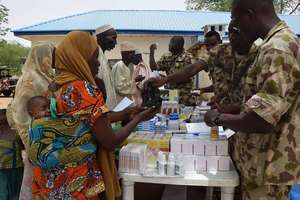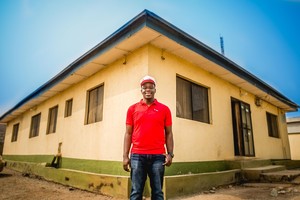When an American nurse working in West Africa became ill with Lassa fever and was evacuated to the U.S. for treatment in 2016, it provided a rare opportunity. With the consent of the patient, researchers were able to closely study, for the first time, how his immune system responded, including the persistence of Lassa virus in his semen after his recovery. An experimental drug was also used as part of his treatment.
A new report, published in The Journal of Infectious Diseases (JID), describes the patient’s immune response, at the cellular level, to Lassa virus infection. A related report describing his treatment—and that of another Lassa fever patient treated in Germany, who also survived—appears in Clinical Infectious Diseases (CID). Although findings from individual patients cannot be generalized to a broader population, the reports suggest areas of needed research for a neglected disease.
Discovered in 1969, Lassa fever affects an estimated 100,000 to 300,000 people each year in West Africa, where the infection is endemic and causes approximately 5,000 deaths annually. In mild cases, symptoms can include fever, weakness, and headache. Bleeding, difficulty breathing, vomiting, facial swelling, muscle pain, and shock may develop in severe cases. Last year, the World Health Organization identified Lassa virus as a top-priority emerging pathogen for research and development.
Lassa virus is primarily transmitted to people through exposure to infected rats or their droppings and urine. Contact with an infected person’s body fluids can also spread the virus. Sexual transmission has been reported, but the extent of viral persistence in the semen of male survivors over time is unknown.
After acquiring Lassa fever in Togo, the American nurse was treated in the Serious Communicable Diseases Unit at Emory University Hospital in Atlanta by a clinical team from Emory with Lassa-specific laboratory assistance from the nearby Centers for Disease Control and Prevention (CDC). He recovered and was discharged 25 days later. Several semen samples taken from the patient had detectable levels of Lassa virus RNA, including a sample 23 days after his discharge. During his recovery, he also developed inflammation of the epididymis, a coiled tube near the testicles that stores and carries sperm. The German patient, treated at Frankfurt University Hospital, had detectable Lassa RNA in his semen 64 days after he was discharged.
“There’s no capacity to monitor persistence of Lassa in the semen in resource-limited areas,” said Emory University’s Colleen S. Kraft, MD, who authored the CID report. “Much like with Ebola, we want to make sure we educate individuals who have recovered from Lassa to use safe sexual practices for a while.”
Over the course of the American nurse’s illness, researchers tracked his immune response, including the activity and function of virus-specific T-cells (immune cells important for fighting viral infections) in his body. The response was surprisingly robust and correlated closely with several symptoms and signs that developed late in his illness, even after Lassa virus could no longer be detected in his blood. This suggests that aspects of his own immune system may have actually caused some harm, said Anita K. McElroy, MD, PhD, author of the JID study, who is affiliated with CDC and Emory.
Future studies could lead to the development of therapies for Lassa fever that dampen certain harmful aspects of the body’s immune response, complementing antiviral drugs that target the virus itself. “First and foremost, we need to do this same type of research in more patients,” Dr. McElroy said. “You’ve got to know what’s wrong in the immune response before you can attempt to fix it.”
The U.S. and German patients’ treatment included oral favipiravir, an antiviral drug licensed to treat influenza in Japan that has also been studied as a possible treatment for Ebola. Both patients appeared to experience few serious side effects from the drug, but clinical trials are needed to determine if the drug is effective against Lassa fever, Dr. Kraft said. The patients were also treated with another antiviral, intravenous ribavirin, which is the current standard of care for Lassa patients. Ribavirin’s availability as an intravenous drug, however, is limited in West Africa, where the disease is most common.
In a related editorial commentary in JID, William A. Fischer II, MD, and David A. Wohl, MD, both of the University of North Carolina at Chapel Hill, noted that Lassa fever remains underdiagnosed and understudied despite being a major cause of disease in West Africa. In commenting on the JID report, they wrote, “After a tragically prolonged pause in Lassa fever research, the work reported by these investigators is an important step in moving the science of this neglected virus into the 21st century.”










